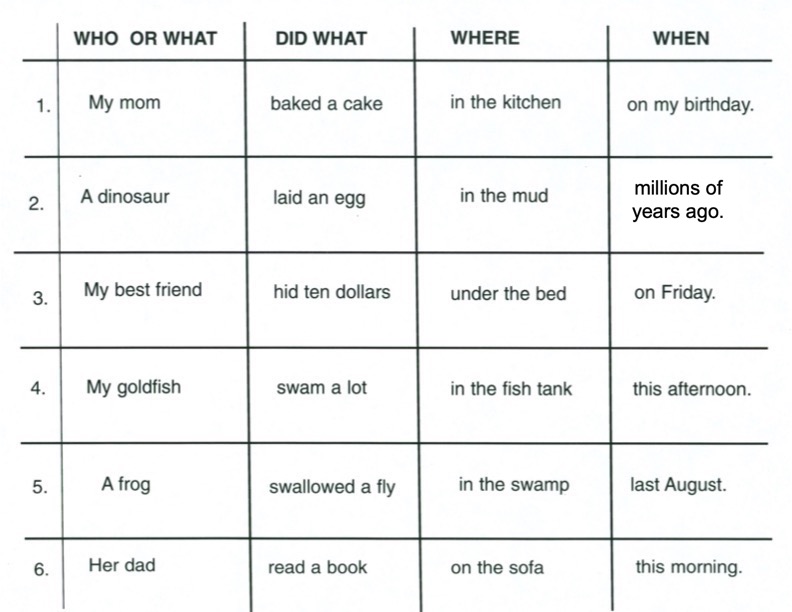…
If you were going to teach English to someone who was just beginning to learn it, what would you teach? There is a game I sometimes play with beginners, a kind of bingo with a die and some beans for markers. Call it Syntax. Student One rolls and everybody puts a bean on the subject chosen by the throw. Then Student Two rolls and we get the verb with object or adverb. Students Three and Four get us where and when.
This bingo-like-game can be used with students who don’t know English by doing an introductory activity getting them familiar with the words; it’s easy to set up with some pictures and spelling. The nouns and verbs are all simple to learn.
The sentences are often funny and that’s the point: English makes sense as long as the syntax is correct.
My mom laid an egg under the bed this afternoon.
My goldfish hid ten dollars in the mud on my birthday.
Her dad swallowed a fly in the fish tank last Friday.
…

…
In English the subject comes first and the verb comes next: “I bake.” Adverbs and helping verbs will go between the subject and main verb: “I can bake a chicken. I often bake one.” Everything else follows after: “I usually bake a chicken for Dad on Friday.” Direct and indirect nouns and pronouns always follow the verb as well: “I also bake a potato for him.” That’s not always the case in other languages. In Spanish, for example, direct and indirect pronouns come before subject and verb: “For him it I bake.” And that’s why English isn’t Spanish.
Where I grew up, being Pennsylvania Dutch, people sometimes spoke with German syntax throwing the cow over the fence some hay and Papa down the stairs his hat. There are many kinds of spoken English. If you grew up saying, “I seen it” instead of “I saw it,” by all means say that. But if you’re learning English, then you must learn the rules.
I often tell my students, as a joke, when they are going home from class, standing on the subway platform or waiting for the bus, they should say to those who are waiting with them, “Excuse me, but could somebody here please tell me what are the twenty helping verbs in English?” Although helping verbs are the foundation of the English language, it would be the rare native speaker who would know them or could tell you that the most important one is do. People who speak a language don’t need to know the rules; the people learning it do.
…
Here is the PDF of the game for you to download and print. Be my guest.
Helping Verbs and Main Verbs
If you are interested in finding out more about helping verbs and main verbs, you can check them out here:
Learning English: Main Verbs
…

In this case clause analysis and function if clause and pharse may be added to teach students of boards appearing in Board Exams
Regards
Partha Sarathi Mukherjee
Good idea!